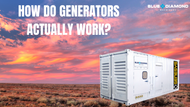How Does a Generator Work?
22nd Jan 2021
A generator is great for backup power during grid outages, or as primary power in industrial or agricultural settings.
In this guide, we explain how generators work to produce electricity and outline the various types and sizes of generators on the market.
How does a generator work?
Generators do not ‘create’ electricity. According to thermodynamic principles, energy cannot be created or destroyed, it can only change in form.
This is exactly what happens in a generator system. Mechanical energy supplied by the engine is converted into electrical energy through the power of motion. The level of energy produced depends on the size of the generator engine.
At a basic level, the steps of this process are:
- Mechanical power produced by the engine is forced into a circuit.
- An electrical current is induced.
- The current is directed through wires to provide power via a magnetic field.
- The various components (see below) work together to control voltage and to keep the system operating as it should.
Generator components and parts

The main parts of a generator include:
- Engine – internal combustion engine used to provide the required mechanical power.
- Engine fuels – options include diesel, petrol, mains gas and propane. The most suitable type of fuel depends on the industry and application.
- Alternator – this is the system that creates the magnetic fields and electron movements.
- Voltage regulator – helps to control the voltage of the output electricity and convert it from AC (alternating current) to DC (direct current) where required.
- Control systems – such as the control panel or user interface, and ATS (automatic transfer switch) which is used to sense a grid outage and start up the system. Some generators may not have an ATS, however.
- Protective systems – these include cooling systems to prevent overheating, exhaust to remove fumes, and lubrication to reduce component wear.
- Housing unit – the external frame that houses and protects the whole system.
Alternator vs generator: what are the differences?
Both of these systems generate electricity but do so in very different ways.
For example, alternators only ever generate AC, while a generator can induce either AC or DC.
Alternators have rotating magnetic fields, while in generators, the field is stationary. Alternators are also smaller and have higher output.
When it comes to household or industrial electricity generators, the alternator is essentially the system that does the job of converting the mechanical energy to electrical. In that sense, modern generators do not really ‘contain’ alternators but are largely alternator systems or ‘AC generators’.
Main types of generators
There is a very wide range of generators available on the market, from small portable inverter types through to very large 3-phase diesel machines for heavy industry.
While there are many types, they are usually categorised into four main generator categories.
- Recreational / inverter – quiet, compact units that produce a very clean voltage through a pure sine wave process. Their uses include camping, boating, small domestic power backup or mobile food vans. Inverter units are particularly good for powering sensitive devices such as laptops and mobile phones as they produce minimal distortion.
- Portable trade – robust portable diesel or petrol generators suitable for use in various trades, such as construction, farming and mining. They could also be used for home backup or on off-grid properties.
- Household backup – gas-powered units for providing backup power to households and small businesses in case of outages. An example is the Generac home generator range, especially designed for home and business standby power use and fitted with ATS to kick in automatically.
- Stationery diesel and 3-phase – these are the largest types designed for commercial and industrial applications. They could be suitable on remote mining sites or other off-grid businesses, or as a backup power source for a supermarket, data centre, or office tower.
Stationary Large Diesel Generators
What type of generator do I need?

The type you choose depends on what you need it for.
For caravan trips- an inverter unit might be all you need to power your appliances, such as a toaster, TV, air conditioner and mobile phone.
Portable trade and inverter units could also be used for occasional home power backup, or to run electric tools. However, for a more substantial backup unit for your home or small business, you may be better off with a generator from the home and backup range.
For heavy industry, such as on a large agricultural property or remote mining site, a stationary diesel generator is likely the best bet, due to fuel efficiencies and power output capacities.
What size generator do I need?

The size depends on what appliances you want to power with it. Here’s how to calculate your needs.
- Look up the power requirements (in watts) for your appliances, both for start-up and continuous running power.
- Add up all the appliances you are likely to be running together from your generator.
- Convert the total wattage to kilowatts by dividing by 1,000 (for example, if your power requirements add up to 2,100 watts, this would be 2.1kW).
Once you have calculated total kW, it will need to be converted to kVA (kilovolt-amperes) to work out the right size generator. Contact our team for professional advice on this and to ensure you get the best type and size of generator for your needs.
How much do generators cost?
There are generators on the market to suit all budgets. The price depends on several factors, such as size, type of fuel, features, brand name, and whether single or 3-phase.
Here is a rough guide:
- Recreational generators (1-7 kVA) – from under $1,000 up to approximately $7,000.
- Portable trade generators (2-12 kVA) – approximately $1,500 to $21,000.
- Home & backup generators (8-20 kVA) – around $5,000 to $10,000.
- Stationary diesel generators (10-1,100 kVA) - $10,000 to $450,000.
See the full generator range at Blue Diamond for more information.
Where can I find the best generator?
When shopping for a generator, make sure to look for a reputable supplier with local service agents that will provide not only expert advice, but also ongoing support and extended warranties.
Feel free to get in touch with us to find out how we can help you find the right generator for your needs.







